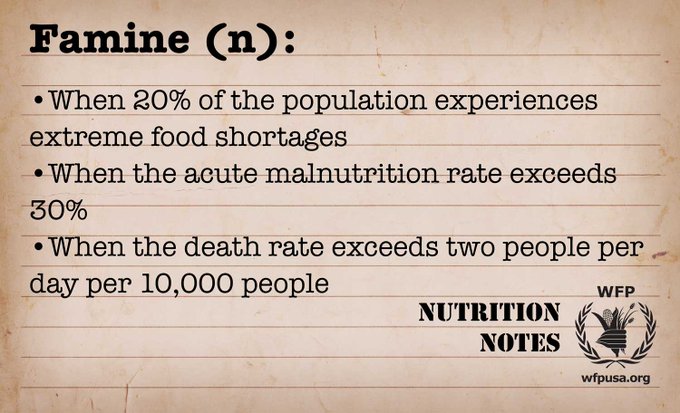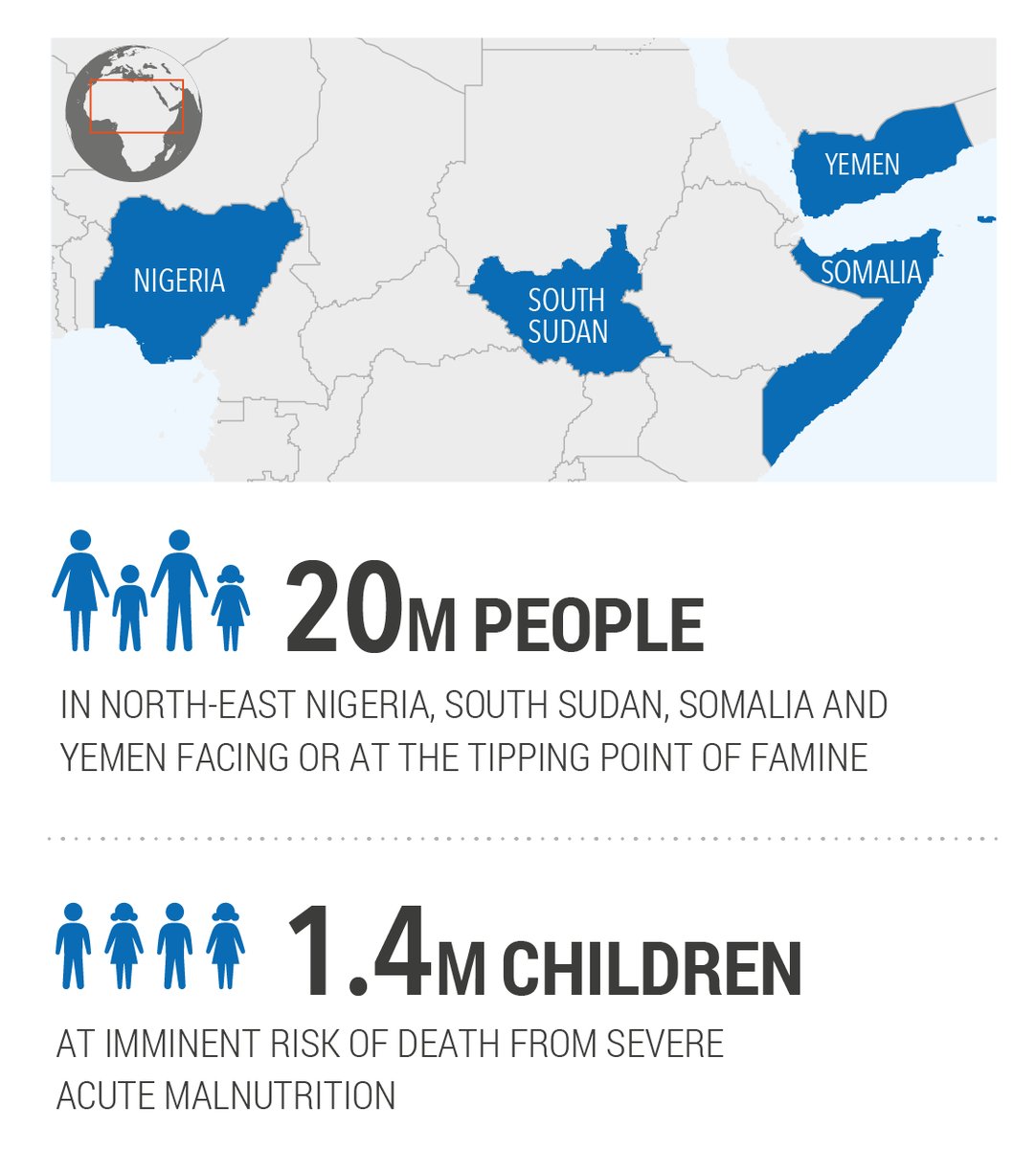Αrt23 Φεβρουαρίου 2017
The world is ignoring an ‘unprecedented’ starvation crisis
By Ishaan Tharoor
Want smart analysis of the most important news in your inbox every weekday along with other global reads, interesting ideas and opinions to know?
The world is in the grip of an astonishing and acute crisis: More than 20 million people in South Sudan, Somalia, northern Nigeria and Yemen face starvation in the next six months, according to the United Nations. Nearly 1.4 million children are at "imminent risk" of death. The scale of the hunger epidemic was described last month by U.S.-based researchers as "unprecedented in recent decades."
The crises are in large part man-made, stoked by ruinous conflicts, collapsing governance and international indifference. Only in one country, Somalia, which is recovering from years of war, is drought the main cause of the current food shortages.
"The situation is dire," warned U.N. Secretary General Antonio Guterres earlier this week, in a desperate appeal for funds. "We need $4.4 billion by the end of March to avert a catastrophe." So far, his organization has raised only $90 million, a drop in the bucket. At a time when the Trump administration has already threatened funding cuts to the U.N., the prospects for global relief look dim.
On Monday, the South Sudanese government, along with the United Nations, formally declared famine in parts of the fledgling nation wracked by war. According to the U.N.'s classification, a famine takes place along certain grim criteria, including when 20 percent of the population in a given area faces "extreme food shortages." It's usually invoked to describe already terrible conditions that are steadily getting worse.
View image on Twitter

Researchers fear that areas of northeastern Nigeria already endured famine-level conditions last year. The region has been wracked by the insurgency of extremist outfit Boko Haram. But despite the Nigerian military's recent gains, some 5.1 million people face severe food shortages. Close to half a million children under the age of five could suffer from acute malnutrition this year, and up to 20 percent could die unless more aid reaches them, according to the U.N.
In Somalia, failed rains last year, along with a poor forecast for the spring, may put as much as half the country's population at risk of acute food insecurity. It was in Somalia in July 2011 when the United Nations last declared a famine. 260,000 people died there in a two-month period.
In Yemen, the toll of grinding civil war, complicated by months of aerial bombardment by a Saudi-led (and U.S.-backed) coalition, has created a shocking humanitarian crisis. Around half a million children are "dangerously malnourished" and at the risk of death. According to a U.N. study released earlier this month, some 7.3 million Yemenis required "emergency food assistance" and around 17.1 million Yemenis were "struggling to feed themselves." That is well over two-thirds of the country's total population.
In South Sudan, aid agencies have been warning for months about the risk of widespread famine in areas ravaged by rival factions. Fields have gone fallow and the population's access to food has dried up.
"Crop production has been severely curtailed by the conflict, even in previously stable and fertile areas, as a long-running dispute among political leaders has escalated into a violent competition for power and resources among different ethnic groups," reports the BBC. "As crop production has fallen and livestock have died, so inflation has soared ... causing massive price rises for basic foodstuffs."
Now 100,000 people are facing starvation, and around a million people are on the brink of famine. Nearly 275,000 children are at risk of starving to death unless the international community intervenes in a rapid and meaningful way, the U.N. warned.
"Our worst fears have been realized," said Serge Tissot, the U.N. Food and Agriculture Organization’s spokesman in South Sudan, to Foreign Policy magazine. "Many families have exhausted every means they have to survive."
Aid workers and humanitarian organizations say much of the crisis was preventable had the international community taken action sooner. The conditions that lead to famines are complex, of course, and bound up with the failure of the states where they take place. But critics also place blame on listless actors abroad.
The U.N.'s vast funding shortfall is the obvious problem. Emergency donor conferences, such as one held on Friday in Oslo to address the crisis in northeastern Nigeria, are attempting to make up the gap.
But the international community has dropped the ball in other ways as well. In the case of South Sudan, for example, the U.N. Security Council failed to pass a punitive arms embargo on the country that could have possibly stemmed the violence and the wanton abuses of its warring factions.
The crisis now, writes Human Rights Watch researcher Jonathan Pedneault, "underscores the complete failure by government, opposition forces, and international actors to end the cycle of abuse."
View image on Twitter

UN warns 20 million people are facing famine in Nigeria, South Sudan, Somalia + Yemen... Trump included Yemen + Somalia in his Muslim ban
As far as President Trump goes, there are still figures within his White House who are deeply suspicious of the United Nations and hostile to funding aid projects overseas.
Hence another bitter irony of 2017: Somalia and Yemen, where millions of people face acute food shortages, have been characterized by the Trump administration as nations that export terror and subjected to a potential immigration ban. When you can't even expect empathy, how can you expect real help?
www.fotavgeia.blogspot.com
The world is ignoring an ‘unprecedented’ starvation crisis
By Ishaan Tharoor
Want smart analysis of the most important news in your inbox every weekday along with other global reads, interesting ideas and opinions to know?
The world is in the grip of an astonishing and acute crisis: More than 20 million people in South Sudan, Somalia, northern Nigeria and Yemen face starvation in the next six months, according to the United Nations. Nearly 1.4 million children are at "imminent risk" of death. The scale of the hunger epidemic was described last month by U.S.-based researchers as "unprecedented in recent decades."
The crises are in large part man-made, stoked by ruinous conflicts, collapsing governance and international indifference. Only in one country, Somalia, which is recovering from years of war, is drought the main cause of the current food shortages.
"The situation is dire," warned U.N. Secretary General Antonio Guterres earlier this week, in a desperate appeal for funds. "We need $4.4 billion by the end of March to avert a catastrophe." So far, his organization has raised only $90 million, a drop in the bucket. At a time when the Trump administration has already threatened funding cuts to the U.N., the prospects for global relief look dim.
On Monday, the South Sudanese government, along with the United Nations, formally declared famine in parts of the fledgling nation wracked by war. According to the U.N.'s classification, a famine takes place along certain grim criteria, including when 20 percent of the population in a given area faces "extreme food shortages." It's usually invoked to describe already terrible conditions that are steadily getting worse.
View image on Twitter

Researchers fear that areas of northeastern Nigeria already endured famine-level conditions last year. The region has been wracked by the insurgency of extremist outfit Boko Haram. But despite the Nigerian military's recent gains, some 5.1 million people face severe food shortages. Close to half a million children under the age of five could suffer from acute malnutrition this year, and up to 20 percent could die unless more aid reaches them, according to the U.N.
In Somalia, failed rains last year, along with a poor forecast for the spring, may put as much as half the country's population at risk of acute food insecurity. It was in Somalia in July 2011 when the United Nations last declared a famine. 260,000 people died there in a two-month period.
In Yemen, the toll of grinding civil war, complicated by months of aerial bombardment by a Saudi-led (and U.S.-backed) coalition, has created a shocking humanitarian crisis. Around half a million children are "dangerously malnourished" and at the risk of death. According to a U.N. study released earlier this month, some 7.3 million Yemenis required "emergency food assistance" and around 17.1 million Yemenis were "struggling to feed themselves." That is well over two-thirds of the country's total population.
In South Sudan, aid agencies have been warning for months about the risk of widespread famine in areas ravaged by rival factions. Fields have gone fallow and the population's access to food has dried up.
"Crop production has been severely curtailed by the conflict, even in previously stable and fertile areas, as a long-running dispute among political leaders has escalated into a violent competition for power and resources among different ethnic groups," reports the BBC. "As crop production has fallen and livestock have died, so inflation has soared ... causing massive price rises for basic foodstuffs."
Now 100,000 people are facing starvation, and around a million people are on the brink of famine. Nearly 275,000 children are at risk of starving to death unless the international community intervenes in a rapid and meaningful way, the U.N. warned.
"Our worst fears have been realized," said Serge Tissot, the U.N. Food and Agriculture Organization’s spokesman in South Sudan, to Foreign Policy magazine. "Many families have exhausted every means they have to survive."
Aid workers and humanitarian organizations say much of the crisis was preventable had the international community taken action sooner. The conditions that lead to famines are complex, of course, and bound up with the failure of the states where they take place. But critics also place blame on listless actors abroad.
The U.N.'s vast funding shortfall is the obvious problem. Emergency donor conferences, such as one held on Friday in Oslo to address the crisis in northeastern Nigeria, are attempting to make up the gap.
But the international community has dropped the ball in other ways as well. In the case of South Sudan, for example, the U.N. Security Council failed to pass a punitive arms embargo on the country that could have possibly stemmed the violence and the wanton abuses of its warring factions.
The crisis now, writes Human Rights Watch researcher Jonathan Pedneault, "underscores the complete failure by government, opposition forces, and international actors to end the cycle of abuse."
View image on Twitter

UN warns 20 million people are facing famine in Nigeria, South Sudan, Somalia + Yemen... Trump included Yemen + Somalia in his Muslim ban
As far as President Trump goes, there are still figures within his White House who are deeply suspicious of the United Nations and hostile to funding aid projects overseas.
Hence another bitter irony of 2017: Somalia and Yemen, where millions of people face acute food shortages, have been characterized by the Trump administration as nations that export terror and subjected to a potential immigration ban. When you can't even expect empathy, how can you expect real help?
www.fotavgeia.blogspot.com


Δεν υπάρχουν σχόλια:
Δημοσίευση σχολίου